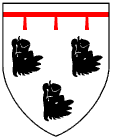
LIVES OF THE BISHOPS OF EXETER
JOHN BOTHE, LL.D. - So his name is spelt throughout his Register. He was the member of a family in good repute, both in Cheshire and Lancashire, and was the third son of Sir Robert Bothe of Dunham in Cheshire, knight, by his wife Dulcia, daughter and coheir of Sir Richard Venables, knight. Of his early life and education few details are recorded. By his uncle William Bothe, Archbishop of York, he was collated to a stall in that minster, and shortly after to the archdeaconry of Richmond; he was also appointed the second warden of the Collegiate Church of Manchester. On the translation of Nevyll to the see of York, King Edward IV. accepted the Papal provision of Dr. Bothe to our vacant see, and restored him its temporalities on 10th June, 1465. The elect and confirmed prelate, within a week later, appointed his dean, Henry Webber, to administer the diocese in his absence, and could not have made a better choice. On 7th July that year, Archbishop Bourchier performed the ceremony of the episcopal consecration; and on 4th February following the king granted him a special pardon for all offences during the tenure of his office of warden at Manchester (Rymer's ' Foedera,' vol. xi. p. 559).
Business prevented his visit of the diocese until February, 1467 ; he then quitted it at the expiration of two years for London. His Register shows that he had returned here in August, 1474, and, after remaining five months, left again for the metropolis. We meet him at Bishop's Clist on 7th March, 1476, when he passed three months in the diocese. This we believe was his last visit.
William of Worcester asserts that King Edward IV. took him for his secretary: his family had been noted for zealous attachment to the house of Lancaster; perhaps our bishop, conceiving that its fortunes were desperate, satisfied his conscience of the expediency of serving under the actual reigning dynasty, for the sake of public peace and security. Hoker, in his 'MS. History,' p. 319, after relating his respectable descent, and his reputation for learning, adds that "he was well versed in the laws of the realm, very courteous and affable to every man, good to the poor, and liberal in all good causes?' Whether there be sufficient grounds for the tradition that the bishop was the donor of our episcopal throne we cannot pronounce; but it is evidently of the character of the time. The previous "Cathedra Episcopi" was of stone, as we collect from the fabric roll of 1328. The repeated arms of Bothe in the vaulting of the chapter-house lead us to think that he put the finishing hand to this beautiful structure, and not his immediate predecessor Bishop Nevyll in transitu, as Leland supposed ('Itin.' vol. iii. p. 53). On quitting the diocese in the summer of 1476, he repaired to his favourite residence at East Horsleigh, a manor that had been given to the see of Exeter by King Henry I., three hundred and fifty years before. Dying there, he was buried in the parochial Church of St. Martin, where his brass effigy represents him kneeling in full pontificals, and, what is unusual, with the chasuble appearing on one side of the cope. The mitre and crosier are of superb decoration; the legend is -
Quisquis eris qui transieris, sta: perlege plora.
Sum quod eris, fueramque quod es. Pro me precor, ora.
Hic jacet Johannes Bowthe, quondam Exoniensis
Episcopus, qui obiit v°. die mensis Aprilis, A°.
Dni M°.CCCC°. LXXVIII°.
However, in his 'Funeral Monuments,' p. 444, contends that he was buried at St. Clement Danes', London. The maimed epitaph he gives commences indeed with Hie jacet, but he reads primo die Aprilis, which unquestionably is incorrect. His brother Sir Williatn Bothe, knight, who died 6th April, 1478, was buried in St. Clement Danes. In a deed dated 2nd September, 1482, under the seal of the warden and canons of St. Mary's College, Ottery, they set forth that Bishop Bothe, late Bishop of Exeter, had given them a sum of money to keep his obit - that an addition had been made to that sum by John Stubbes, the precentor of Exeter, and Robert Barfoth Archdeacon of Bamstaple - that they had invested the sum total in the purchase of two ferlings of End in Mettecombe, within the parish of Ottery, to meet the expenses of such obit, and charge themselves with a payment of ten shillings per annum to the Dean and Chapter of Exeter, if they fail in the fulfilment of this obligation. His memory was also perpetuated in Exeter Cathedral, for we find in Queen Elizabeth's regrant to its church on 5th July, 1585, an estate in the parish of Crediton, which was answerable for the expenses, "pro manutentione obitus Johannis Bowthe, quondam Exoniensis Episcopi."
The Register of our prelate commences with 24th June, 1465, but has not been so carefully conducted as those of his predecessors ; besides, no little perplexity is occasioned to its peruser by the transposition of the folios through the ignorance of the binder.
ARMS: - Argent three Boars' heads erect sable; in chief a label of three points gules.
